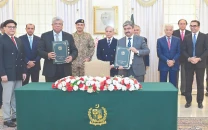Experts advocate women empowerment in trade
Say it could facilitate regional trade, economic integration in South Asia

Experts at the report launch of the policy document on women in trade emphasised that empowering women in trade could facilitate interregional trade and economic integration in the South Asia region.
The Sustainable Development Policy Institute (SDPI) recently launched its report titled "Empowering Women in Tradea South Asian Perspective" with the support of the Friedrich Naumann Foundation for Freedom (FNF).
Dr Vaqar Ahmed, Joint Executive Director of SDPI and co-author of the report, in his interventions, stated that regional and free trade agreements and GSP+ should benefit women-led enterprises. "Tax policy and tax administration reforms require a gender lens to reduce the cost of doing business for women. Pakistan Single Window (PSW) and other digital economy reforms could also reduce information and market access costs. The Federal Board of Revenue (FBR) and the State Bank of Pakistan (SBP) need closer coordination to help many women transition their businesses from the informal to the formal sector," he said. Dr Arif Saleem, Faculty of Management Sciences at Islamic International University, noted that the report highlights various challenges for women in Southeast Asia, where barriers are higher than in other regions. He praised the report's robust methodology and quality assurance measures, ensuring the validity of its findings.
Aniqa Arshad, Programme Manager, Friedrich Naumann Foundation Pakistan, commended the comprehensive study by SDPI for covering many key insights across South Asia. She highlighted the indispensable role of women in trade, the challenges they face, and their achievements addressed in the report. The report, she said, identified barriers to women's integration in trade due to social and cultural challenges, gender discrimination, mobility restrictions, and limited access to business networks.
Mahnoor Arshad, Research Associate and co-author of the report, delivered a detailed presentation on the study's findings. She explained that the study focused on four key areas: how women can benefit from pre-existing trade agreements in South Asia, regional and global integration of women in trade, bottlenecks in various sectors, and the roles of public and private sectors and regulators.



















COMMENTS
Comments are moderated and generally will be posted if they are on-topic and not abusive.
For more information, please see our Comments FAQ